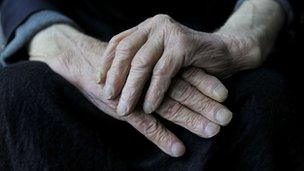Dementia care: Your stories
- Published

A woman in Aberdeen has claimed her husband, who had dementia, was given 106 different carers in one year.
Jeanette Maitland said the number of different care workers contravened her husband Ken's basic human right to dignity.
Mr Maitland died from a dementia-related illness last week, and Aberdeen City Council said it will look into the concerns his wife has raised.
BBC News website readers have been relating their experiences of care.
Kay, granddaughter-in-law of dementia patient, Devon
My husband's grandmother has dementia and she has a different care worker coming in each day.
Some of them don't even bother to turn up when they realise she lives in a rural area as they can't be bothered to drive outside the towns.
If they make her a cup of tea she considers herself lucky.
In the first few months of her care they couldn't even get her name right, referring to her in her notes by three different names.
Most of the care workers who come are very young - they stay in the job for a short while and then move on to something better.
Also, you have to fight tooth and nail with the local authority for even a handrail for the bath.
The response from them is normally that the request is in the system and is being processed.
There's supposed to be a system in place but it's not there.
If there was any other option we would take it.
She is desperate to stay in her own home and we want to keep her there for as long as we can.
Granny is 89 years old and she has always been so sharp and such a character.
She served her country during the war in the Women's Air Force and has farmed all her life - she deserves better than this, as do all our elderly.
Sue, daughter of a dementia patient, West Midlands
My father was diagnosed with dementia three years ago, and my sisters and I have been extremely distressed by his treatment.
The issue of personal care has been a real challenge for my father - he objects to people washing him.
He gets agitated about this and was sectioned and sent to a psychiatric hospital.
Later he suffered a stomach complaint and was transferred to another hospital. One care professional at the hospital didn't know why he had been sectioned, and this is the crux of the problem.
There is no co-ordinated approach - social services and mental health services don't talk to each other.
If you stand back dispassionately, having dementia is a very undignified experience.
Sometimes families can't take on the responsibility of a loved one so have to rely on professionals.
They may articulate what is right, but in practice it is a different story.
Nobody has been deliberately cruel but attitudes and systems need to change.
Humane strategies need to be developed and adopted across social care and health settings with a much greater degree of co-operation, information sharing and family involvement.
Extending life expectancy is not a benefit if the last years of life are spent in painful and undignified circumstances.
Lucy, neuroscience nurse, Oxfordshire
There is an enormous shortage of carer workers in England at the moment.
Unfortunately it is not a job that many people want to do.
Some people do it for love but it is poorly paid and highly pressurised.
I am a nurse and patients frequently wait in hospital for months for a care package to be set up.
In our local hospital we have had to open a specialist ward for those awaiting care packages.
Once a care package is provided, it is at the expense of the taxpayer, which is correct of course.
But I'm not sure that people know how difficult and costly co-ordinating and providing this care is.
It would be preferable for dementia patients to have a small number of core care workers.
But given the budget constraints facing the NHS, if the quality of the care is of a good standard we should be grateful that the system is there, and allows people to remain in their own homes rather than in residential homes or hospitals.
Martin Butler, son of a stroke patient, Fife, Scotland
Eleven years ago, my mother was diagnosed with dyspraxia following a stroke and was unable to talk.
The standard of care obviously varies between different councils, but my own experience of my mother's care workers in Fife is a positive one.
She had a thorough assessment of her care needs and whenever she had to go into hospital, she would be assessed again.
From the time my mother was diagnosed, she only had a core group of eight care professionals caring for her.
She had two regular care workers who came in four times a day.
During weekends and holidays obviously, she had others, but the group covering my mother was only about seven or eight and, mostly, the same four.
These four care workers were invited to join the family at my mother's funeral earlier this year and I asked them to wear their uniforms, such was my regard for them.
If there were any shortages of care workers, it didn't impact on service.
<italic>Interviews by Andrée Massiah, BBC News</italic>
- Published18 May 2012